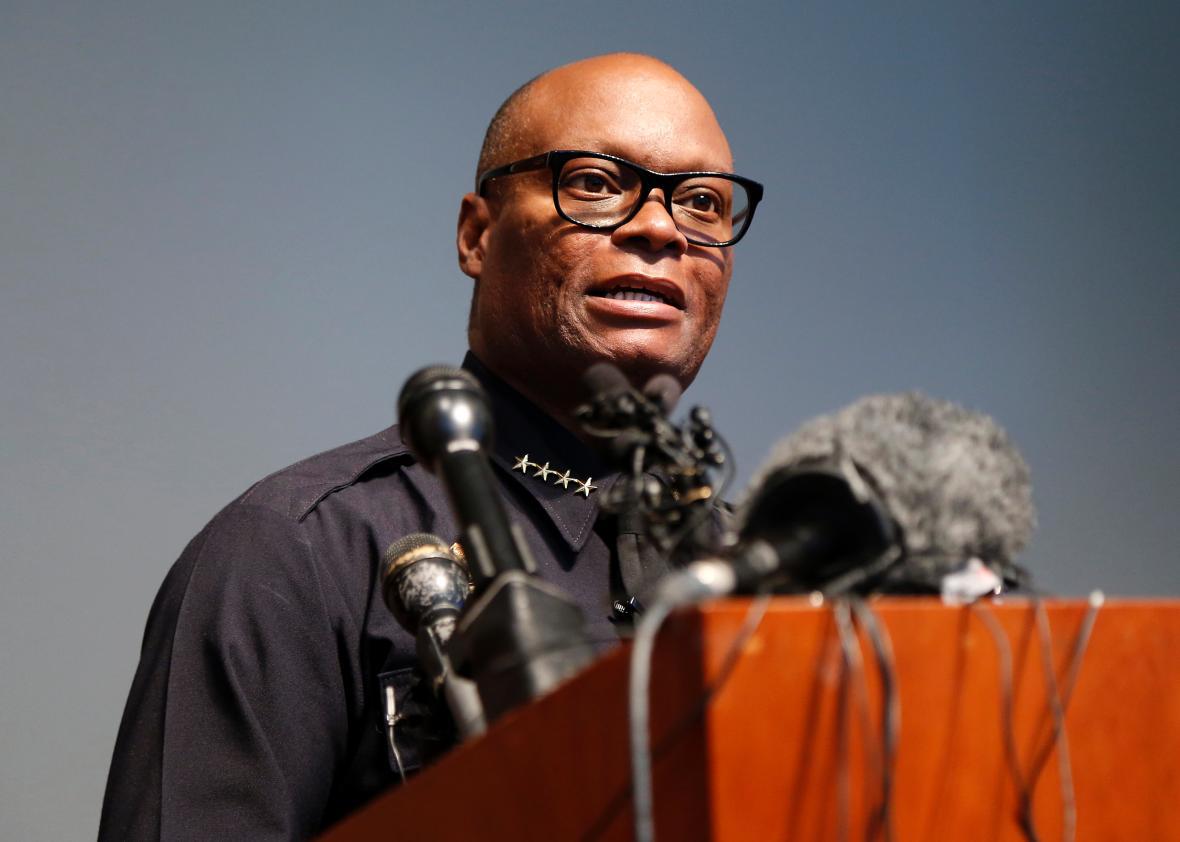All available evidence suggests that when Micah Johnson sniped police officers in downtown Dallas on Thursday, he intended it as a political act.
During the ensuing standoff, he told police negotiators that he was angry about the recent apparently unwarranted killings of black men by police, and “stated he wanted to kill white people, especially white officers,” according to Dallas Police Chief David Brown.
Johnson could not have reasonably believed that he’d shoot enough cops to actually diminish the capacity of law enforcement agencies to unjustifiably kill black people. He did it to send a message, to arbitrarily terrorize cops in the way that he felt arbitrarily terrorized by them.
Am I arguing, then, that journalists (like me) should be calling Johnson a terrorist?
No, even though I think the dictionary definition of that word clearly applies to him.
I think the fact that almost nobody is calling Johnson a terrorist —like almost nobody called Dylann Roof (the Charleston, South Carolina, church shooter) or the Oregon wildlife refuge occupiers terrorists—demonstrates how uselessly arbitrary and loaded that word has become, and I think it’s time for journalists to stop parroting it uncritically.*
I’ll grant you that what I’m about to claim is an unprovable counterfactual, but past experience suggests to me that if Micah Johnson’s name had been Muhammad Jabir, right-wing media would have immediately jumped on the T-word. If his Facebook activity had linked him to Islamism (instead of Black nationalism, as in Johnson’s case), mainstream media would have at least batted it around, too.
We used to use terrorist to describe all kinds of people, from Irish Catholic republicans to American Jewish radicals. But since 9/11, we’ve been using it much more swiftly in reference to Islamists. (In fairness, that’s partly because Islamists have been doing a lot of terrorism over that time.)
You might be thinking, “But people DID call the Oregon occupiers terrorists! Didn’t this very blog detail that controversy?
Indeed, it did. Likewise, now that we’re a few days out from Dallas, we’re seeing a few people arguing that Johnson was a terrorist.
But the very existence of those articles proves my point: Nobody wrote any think pieces about whether to call Umar Farouk Abdulmutallab (the underwear bomber) or Abdelhamid Abaaoud (ringleader of the Paris attacks) terrorists. It was the immediate consensus that they were terrorists. I wonder what those two names have in common?
In contrast, whether to apply the T-word to Johnson, Roof, or Colorado Planned Parenthood shooter Robert Dear has been the subject of public debate. I wonder what those three names have in common?
We call Islamists terrorists even when the description isn’t apt, as in this CNN lower third from a story about battles between ISIS and Iraqi military forces over the control of territory—something that meets the dictionary definition of war much better than the definition of terrorism.
Certainly, ISIS uses terrorism as a tactic, but that doesn’t make everyone who fights for ISIS categorically a terrorist, any more so than everyone who’s ever fought for the IRA. (Please commenters, note that nowhere here have I made the slightest moral equivalency between any of the groups or individuals I’ve mentioned.)
The fact that terrorists has acquired a powerful religious—and specifically Islamic—connotation is substantively consequential. Calling a suspect a terrorist gives authorities enhanced powers to investigate, charge, and punish. Politicians use the T-word to stoke public anxieties and gain support for their policies, or they studiously avoid the word if doing so bolsters a different narrative they fancy.
It’s revealing that there was little debate among writer-types like me about whether to call Fort Hood shooter Nidal Hasan a terrorist.* Rather, government was the epicenter of that debate. The Obama administration avoided the T-word for six years, purportedly to avoid biasing Hassan’s judicial process, with allegedly ulterior motives ranging from a desire to preserve the narrative of a declining al-Qaida to a miserly denial of benefits to the victims’ families
If a prosecutor or a politician or anybody else involved in a story calls someone a terrorist (or notably doesn’t), that’s important and media should report it, with clear attribution. But I’m not sure if reporters themselves should be labeling people with a word that has become, in effect, discriminatory.
Some of my fellow word people, in discussing this same issue, have arrived at a less extreme conclusion than mine: Just use the T-word consistently, they say. Maybe that was once the right advice, but words and their connotations change over time with their usage, and therefore so must news organization policies.
The big problem with illegal immigrant wasn’t that reporters applied it inconsistently—the term simply became too judgmental, too toxic for neutral copy. So, in 2013, the Associated Press Stylebook dropped it.
Likewise, I think we’ve reached the same point with the T-word. Reuters—a less influential force in American journalism style than the AP—agrees with me. From its style guide:
Reuters may refer without attribution to terrorism and counterterrorism in general, but do not refer to specific events as terrorism. Nor does Reuters use the word terrorist without attribution to qualify specific individuals, groups or events.
I think that’s the right policy, and the AP should follow suit.
Eschewing both terrorists and illegal immigrants alike is in keeping with a broader and widely accepted best practice for journalists: Avoid labels! When possible, describe what people do instead of labeling what you think they are.
*Correction, July 12, 2016: This post originally misspelled Dylann Roof’s first name and Nidal Hasan’s first and last names.
